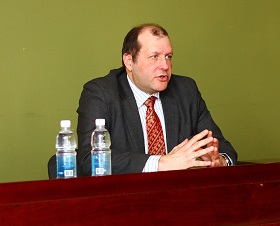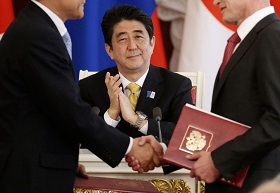It was reported in the press last week that Dmitry Medvedev would be paying a visit to the Kuril Islands, a move that has received harsh criticism in Tokyo. All this is unfolding against the background of President Vladimir Putin’s upcoming visit to Japan. RIAC expert and Head of the Department of Oriental Studies at MGIMO-University Dmitry Streltsov discusses whether the two sides will be able to resolve the issue of disputed territories.
It was reported in the press last week that Dmitry Medvedev would be paying a visit to the Kuril Islands, a move that has received harsh criticism in Tokyo. All this is unfolding against the background of President Vladimir Putin’s upcoming visit to Japan. RIAC expert and Head of the Department of Oriental Studies at MGIMO-University Dmitry Streltsov discusses whether the two sides will be able to resolve the issue of disputed territories.
What can you tell us about Dmitry Medvedev’s upcoming visit to the Kuril Islands and the reaction of the Japanese authorities to this news?
I don’t think there is anything to discuss here, as it is the duty of the Government of the Russian Federation to safeguard the economic development of the Kuril Islands – a territory that has been, and still is neglected in terms of social and economic development. And it is completely natural that a new programme of priority development has been adopted, something that in my opinion has nothing to do with international politics, much less relations between Russia and Japan. All the more so because we are talking about the Kuril Islands, rather than individual islands that Tokyo has laid claim to.
Taken in the international context, however, I don’t think we should attach too much significance to Medvedev’s announcement against the background of Putin’s visit to Japan. The visit is important for domestic politics in Russia.
Do you think any breakthrough decisions with regard to the Kuril Islands could be made?
No. Talks are ongoing about the fate of the peace treaty, but nobody has raised the question of whether the dispute over the Kuril Islands should be resolved first. That is, a number of decisions are expected to be formalized – those on the peace treaty, economic cooperation and the development of political dialogue between the two countries. There is no point in bringing a specific element of Russian–Japanese relations to the fore.
Besides, there is still much to do before the visit takes place. In late August 2015, Minister for Foreign Affairs of Japan Fumio Kishida will visit Moscow. His delegation will include businesspeople, which is almost unheard of – businesspeople do not accompany ministers of foreign affairs on official visits.
This all points to the fact that preparations for Putin’s visit to Japan have really entered the final stage, and the economic aspect of the visit will be of particular importance. In addition to this, while he is in Moscow Kishida will most likely take part in the work of the intergovernmental commission on economic cooperation, which has not taken place at the highest level for three years. The process, as Mikhail Gorbachev once said, has begun.
As for the territorial disputes, however, I don’t see how a breakthrough could be reached. No matter what decision is made, one side will be left unsatisfied. Neither side is willing to make any concessions, so the conflict will be frozen for a time. However, it may be possible to resolve the issue through continued negotiations and developing economic cooperation. I’m cautiously pessimistic about this particular issue.
Interview by Daria Khaspekova, Editor-in-Chief, RIAC web portal.





